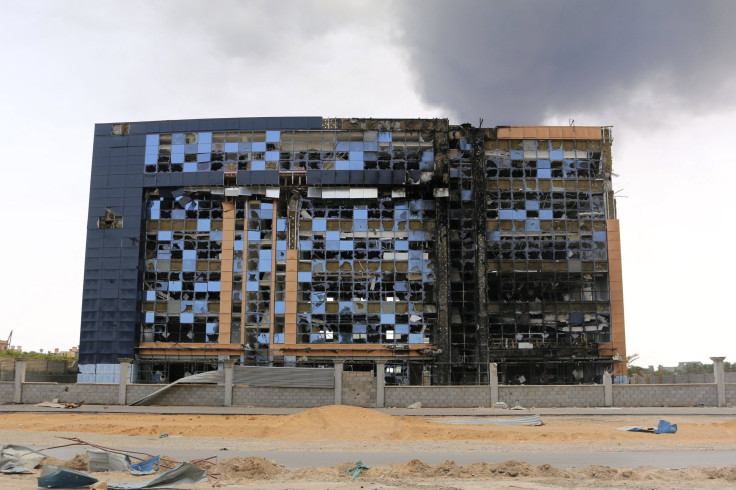Benghazi Attack: Libyan Militants Take Over A Libyan Special Forces Base In Benghazi

At least 30 people died in Benghazi Tuesday in a takeover of a Libyan special forces base by Islamist insurgents and rebel militias. A special forces spokesperson confirmed to Reuters the Islamist militants took over the base after the battle, which involved rockets and warplanes.
"We have withdrawn from the army base after heavy shelling," Saiqa special forces officer Fadel Al-Hassi told Reuters.
The attack came on the same day reports said former Deputy Prime Minister Mustafa Abushagor was kidnapped. He was due to take office as a newly elected member of the House of Representatives in August.
Tuesday’s military base takeover followed a weekend of intense clashes in both Benghazi and Tripoli. In Benghazi, battles between Libyan special forces and insurgents Sunday left at least 36 people dead most of them civilians, Reuters said.
In Tripoli, 23 Egyptian workers were killed when a rocket hit their building Sunday. The next day a rocket hit a major fuel tank sparking a fire that closed Tripoli International Airport and plunged the city into darkness. Residents in Tripoli were without water as the power loss cut the water supply.
In just two weeks, nearly 160 people have been killed in Tripoli alone and at least 10 governments have either issued warnings for their citizens to leave the city or closed down their embassies.
Tuesday’s battle and last weekend are just a few examples of the constant clashing taking place in Tripoli and Benghazi as the country becomes increasingly more chaotic. Since the 2011 revolution that ousted Moammar Gadhafi, Libya has grown more dangerous as heavily armed rebel militias are fragmented and continue to fight each other. There are dozens of militias currently operating in the country and allegiances between them continue to be born and broken.
Tensions have been particularly high in the past few months between the country’s Islamist groups and Gen. Khalifa Hifter, a former top officer in Gadhafi’s armed forces. Hifter is allied with a group of about 6,000 soldiers with ties to the former regime and launched a crackdown on the country’s Islamist militant groups. Recently, special forces and certain air force units also joined Hifter’s Operation Karama (dignity in Arabic).
In Benghazi, special forces are fighting members of the old Benghazi Shura Council who have joined Ansar Al-Sharia. The latter has be classified as a terrorist organization by the United States and has been blamed for the 2012 attack on the U.S. consulate in Benghazi.
“We remind America, if they intervene, of their defeats in Afghanistan, Iraq and Somalia, because they would face in Libya something much worse. It was America who urged Hifter to turn the country towards war and bloodshed,” leader of Ansar al-Sharia Mohamed Zahawi said in May.
© Copyright IBTimes 2025. All rights reserved.






















